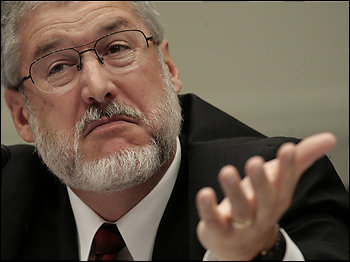Cheney Advisor Screens Bills for Executive Encroachment
Dick Cheney’s staff is routinely reviewing all legislation to ensure it does not diminish presidential authority before forwarding to President Bush for his signature, reports the Boston Globe‘s Charlie Savage.
The office of Vice President Dick Cheney routinely reviews pieces of legislation before they reach the president’s desk, searching for provisions that Cheney believes would infringe on presidential power, according to former White House and Justice Department officials.
The officials said Cheney’s legal adviser and chief of staff, David Addington, is the Bush administration’s leading architect of the “signing statements” the president has appended to more than 750 laws. The statements assert the president’s right to ignore the laws because they conflict with his interpretation of the Constitution. The Bush-Cheney administration has used such statements to claim for itself the option of bypassing a ban on torture, oversight provisions in the USA Patriot Act, and numerous requirements that they provide certain information to Congress, among other laws.
Previous vice presidents have had neither the authority nor the interest in reviewing legislation. But Cheney has used his power over the administration’s legal team to promote an expansive theory of presidential authority. Using signing statements, the administration has challenged more laws than all previous administrations combined.
“Addington could look at whatever he wanted,” said one former White House lawyer who helped prepare signing statements and who asked not to be named because he was describing internal deliberations. “He had a roving commission to get involved in whatever interested him.”
Knowing that Addington was likely to review the bills, other White House and Justice Department lawyers began vetting legislation with Addington’s and Cheney’s views in mind, according to another former lawyer in the Bush White House. All these lawyers, he said, were extremely careful to flag any provision that placed limits on presidential power. “You didn’t want to miss something,” said the second former White House lawyer, who also asked not to be named.
While the constitutional significance of the “signing statements” is dubious at best, the fact that the vice president’s chief counsel is vetting laws does not strike me as problematic. Surely, the president has the authority to staff policymaking decisions as he sees fit. Nor is it unreasonable for the Executive branch to want to safeguard its power from potential encroachment from gigantic legislative bills that number in the hundreds, if not thousands, of pages.
What is odd, however, is that they do not simply advise the president to veto the bills in question of that grounds rather than carrying on the “signing statements” charade. While it’s not inconceivable that some Justices will take those into account–after all, some take foreign legal decisions under advisement–it’s a rather circuitous and risky means to solving a problem that the president has direct power to fix.





Republicans always do this. When the Democrat is elected, the powers are gone. Clinton is an example of why Presidential powers were quickly taken away from the Presidency.
So the scandal is the guy who is constitutionally required to preside over the senate “The Vice President of the United States shall be President of the Senate, but shall have no Vote, unless they be equally divided.” has a guy in his office who looks over bills (which will be coming up before his boss and if the senate is divided his boss may be required to vote on them) and part of what he looks at is if the bill might interfere with the bosses boss rights and duties under the constitution. The several times the bosses boss puts in a standard boiler plate that avoids an immediate confrontation during war time but preserves at least a fig leaf to protest against the law later, said protest likely to end up before the judiciary. And remember this tension between the branches was embodied into the constitution. Its part of the plan.
I guess that settles the question of a Ftizmas any time soon as if this is the most horrifying scandal of the evil Bushitler regime then nothing else must be on tap.
It is to laugh.
Yetanotherjohn I think you might be mistaken as to being president of the Senate as a requirement for the VP. That seems to be his only lawful function, but as VP he does work for the Chief executive.
Zelsdorf,
The quote I included came directly from the constitution. Look under article one, section three, fourth paragraph.
The Vice President of the United States shall be President of the Senate, but shall have no Vote, unless they be equally divided.